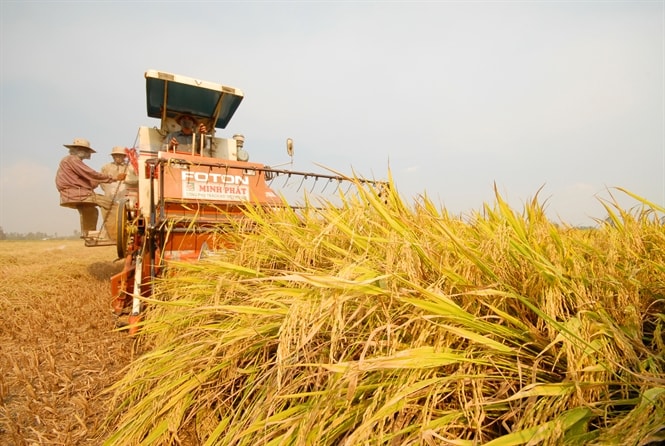Finding a breakthrough in cooperative economics
On October 14, in Hanoi, the Ministry of Agriculture and Rural Development held a conference to assess the situation of innovation and development of forms of cooperative economic organizations in agriculture. Minister of Agriculture and Rural Development Cao Duc Phat chaired the conference.
 |
| Minister Cao Duc Phat directed the conference. |
Speaking at the conference, Minister Cao Duc Phat said that in the reorganization of production, it is necessary to innovate and improve the operational efficiency of cooperatives and forms of cooperation and association. The Party and the State have many policies and guidelines for innovation and development of the collective economy. However, frankly speaking, in general, up to now, it can be assessed that agricultural cooperatives have not been really active and effective. This is a concern for each of us.
According to the Minister, the issue here is not only to re-register existing cooperatives according to the provisions of the Law on Cooperatives, but the key is to find solutions to make cooperatives operate more effectively. If only re-registering the cooperative's operations, it will not solve any problem.
At the conference, Mr. Ma Quang Trung - Director of the Department of Cooperative Economics and Rural Development reported on the situation of innovation and development of forms of cooperative economic organizations in agriculture.
The report said that in recent years, cooperative groups have continuously developed rapidly, increasing by an average of 3.3% per year. Currently, the country has 61,571 cooperative groups and 10,339 agricultural cooperatives with 6.7 million members. The cooperative groups have supported each other in terms of seeds, techniques, application of technical advances, labor, cooperation in product consumption, land preparation, capital, etc., thereby helping members increase production capacity and increase household economic income.
The highlight of the cooperative economic organization activities is the chain production linkage in agriculture. Linking production with processing and consumption, building large fields. The forms of linkage are relatively diverse, including linkage between farmers and cooperatives; farmers with enterprises; cooperatives, cooperative groups with enterprises, etc.
Linkages are implemented in the provision of input materials, technical guidance, technology transfer, and product processing and consumption between farmers, farmers' organizations and enterprises.
The sectors that have developed strongly in terms of production and consumption linkages include rice in the Mekong Delta, tea in the Central Highlands and Northern mountainous provinces, sugarcane in the Central provinces, and milk in some Central and Central Highlands provinces.
According to statistics from 13 provinces/cities, in the 2014 summer-autumn crop in the Mekong Delta, a total of 101 enterprises signed contracts to produce and purchase rice from farmers. The total area of enterprises signing contracts to produce and purchase rice from farmers was 70,827 hectares.
And administrative
Participating in the conference, delegates said that the state needs to have stronger policies for cooperative economy, with the focus on the linkage chain in agricultural production. Thereby creating favorable conditions for enterprises and farmers to cooperate in business.
 |
| Chain linkage in agricultural production creates breakthroughs in stages from production to processing and consumption. |
Referring to the limitations in the organization of water cooperatives, Mr. Nguyen Van Tinh - Deputy Director General of the General Department of Irrigation pointed out that: That is, the majority of the staff of water cooperatives do not meet the requirements of the task. 83% of the staff have not been trained in professional expertise.
Minister Cao Duc Phat said that experience shows that any cooperative established based on objective practical requirements will survive and develop. Those established based on imposition will sooner or later collapse.
The Minister asked, who will be the teacher to teach us how to operate cooperatives effectively? Based on reality, the Minister suggested that localities and units should go directly to typical cooperative models to learn and transfer knowledge to each other right there.
Not only pointing out the difficulties, Mr. Tran Hoang An - Chairman of Evergrowth Dairy Cooperative in Soc Trang province also proposed that the government should create conditions for the cooperative to build a milk processing factory. The reason Mr. An proposed was because at this time in Soc Trang there is a milk processing factory and is deciding on the price. There was a time when the factory turned its back on dairy farmers.
“Currently, we only have over 2,000 dairy farming households, but if we are being oppressed by factories, what will happen to the tens of thousands of farmers in the future? Only when the cooperative has a processing and consumption factory to compete with the existing milk factories, do we believe that farmers will be rich and the cooperative will become stronger,” said Mr. An.
The speech was continuously applauded by the whole hall and immediately after that, Minister Cao Duc Phat requested the Department of Animal Health to go and check the information and report to the Minister soon. That was the opinion of Mr. Phan Quoc An - Head of Quy Hien Livestock Cooperative, Lao Cai province.
Mr. An informed that the Agricultural Restructuring Project stated that it would reduce administrative procedures, but his own cooperative was being bureaucratized, causing great difficulties in selling its products.
Specifically, to sell eggs within the district, there must be a veterinary hygiene stamp. To sell eggs outside the district, in addition to the stamp, there must be a set of quarantine and animal product transportation records. This quarantine cost makes each egg incur an additional 50 VND.
What is more important, according to Mr. An, is that the certificate is only valid for the day. If we want to be good citizens and comply with regulations, we need to have an employee on duty at the Veterinary Station 24/7. Otherwise, when we need to sell goods, if the officer who issued the certificate is absent, we will not be able to sell goods.
“After all, it is just a matter of issuing a certificate, but who can quarantine any eggs?” – Mr. An concluded.
“The daily demand of Lao Cai province is about 50,000 eggs, and Bao Thang district alone is about 20,000 eggs. Because of the difficulties in procedures when going outside the district, we only plan to produce enough for Bao Thang district, not daring to expand to other districts even though our potential is fully capable of meeting the demand,” Mr. Phan Quoc An said regretfully.
According to NNVN






